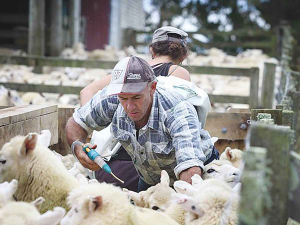'Living labs' to tackle emissions
Living labs that bring together expertise at locations around New Zealand are among potential solutions identified by researchers to help the country move towards a more climate resilient future.
 Farmers bringing stock on to farm are urged to have a quarantine drenching regime in place to further prevent the spread of triple drench resistance.
Farmers bringing stock on to farm are urged to have a quarantine drenching regime in place to further prevent the spread of triple drench resistance.
Farmers importing stock onto their farm are being urged to have a quarantine drenching regime in place to further prevent the spread of triple drench resistance.
AgResearch scientist Dr Dave Leathwick says there has been a dramatic upsurge in the number of farms with drench resistance in the past 18-14 months, often involving several different worm species. Leathwick says, as a consequence, an increasing number of farmers are buying problems on a truck.
“There are so many resistant worms out there that farmers are now much more likely to import them onto their farms with brought-in stock.”
He says this does not just apply to those trading lambs, as several documented cases have involved farmers grazing hoggets off the farm and bringing triple drench resistance home when they return.
Leathwick believes it is more important than ever to have effective quarantine treatments or procedures in place. He says this is due to the prevalence and severity of resistance being seen around the country.
Leathwick advises that there are only two drench products which should be considered for the purpose. Those are the drenches that contain one of the newer action families – monepantel or derquantel.
“As there are only two products which meet this criterion, this choice is pretty easy.”
He says in the past, the use of combinations of the older drench families would have been recommended as quarantine drenches, but this is no longer acceptable.
As well as a quarantine drench, imported animals should be held off pasture for at least 24 hours. Where this is not feasible (e.g., unit loads of sheep or cattle) it is recommended that treated stock be held on wormy pastures for 24 hours. They should be followed by adult animals to mop up any surviving worms.
Leathwick also encourages the use of a ‘knock-out’ lamb drench in late summer or early autumn to slow or stop any build-up of resistant worms surviving the routine drenches given earlier in the season.
“In terms of what drenches are suitable for this purpose, the same rules apply, that is products containing the newer action families.” he explains. “There is so much resistance around today that it’s just not worth the risk of using something else.”
Leathwick says the escalation of triple resistance is causing issues for sheep farmers all around the country. It can profoundly affect farmers’ ability to control parasites and continue to farm as they have in the past.
“Those that don’t have it yet need to be extra vigilant to make sure they don’t get it.”
Bankers have been making record profits in the last few years, but those aren’t the only records they’ve been breaking, says Federated Farmers vice president Richard McIntyre.
The 2023-24 season has been a roller coaster ride for Waikato dairy farmers, according to Federated Farmers dairy section chair, Mathew Zonderop.
Ministry for Primary Industries (MPI) director general Ray Smith says job cuts announced this morning will not impact the way the Ministry is organised or merge business units.
Scales Corporation is acquiring a number of orchard assets from Bostock Group.
Family and solidarity shone through at the 75 years of Ferdon sale in Otorohanga last month.
The Ministry for Primary Industries (MPI) has informed staff it will cut 391 jobs following a consultation period.
OPINION: Scientists claim to have found a new way to make a substitute for cow's milk that could have a…
OPINION: The Irish have come up with a novel way to measure cow belching, which is said to account for…